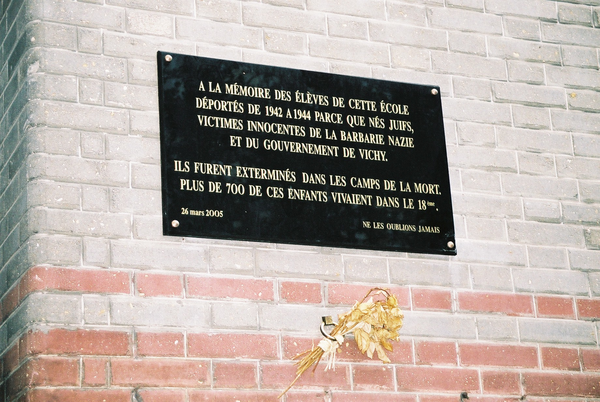Browse by Tags: french studies
 | Up a level |
Number of items: 2.
President Chirac's (1995-2007) stance on the Vichy regime and antisemitism.
Shared with the World by Mr Emmanuel Godin
After President Chirac's official recognition (1995) that France actively participated in deportation of Jews, commemorative plaques were erected on the wall of each Parisian school stipulating the number of children who had been deported in each 'arrondissement'. (Here a plaque in the XVIII arrondissement, from which more than 700 Jewish children were rounded up by the French police before being deported). Chirac's 1995 discourse (here included in French) about the responsibility of the French state in the deportation of Jews marked a departure from the previous Gaullist orthodoxy. On the occasion of the official opening of the new exhibition in the French pavilion of the Auschwitz-Birkenau Memorial and Museum in January 2005, President Chirac reflected on the impact of the Holocaust on France (text in English). A few days before, President Chirac inaugurated the 'Memorial de la Shoah' in the IV arrondissement of Paris. Just outside the Memorial, 'Le Mur des Justes' (Righteous among the Nations) commemorates the French people who risked their lives to save Jews from extermination during the Occupation (6 photos included). Facing the 'Murs des Justes', in a street recently remaned 'Allée des Justes', a commemorative plaque adornes the door of the local secondary school (College Frederic Couperin, Photo included. It reminds passers-by that out of the 11,000 Jewish children arrested by the Vichy police in France between 1942 and 1944, 500 came from the 4th arrondissement of Paris. They were deported to Auschwitz.
A Weblink to the INA site (Institut National de l'Audiovisuel) will enable visitors to see how the French television channel France 2 covered the event. This resource also includes a link to the Memorial de la Shoah in Paris, a site which provides invaluable resources (see in particular its 'Centre de Documentation Juive Contemporaine'.
Students with a good understanding of postwar politics and history may want to use these sources to explain why Chirac broke from the postwar Gaullist narrative.
Shared with the World by Mr Emmanuel Godin
Students Politics in Toulouse
Shared with the World by Mr Emmanuel Godin
Student politics in France is often dominated by a high degree - and high visibility- of political radicalism. If such radicalism is often the product of a well-organised minority on the extreme left of the political spectrum, it remains a central part of university life. As part of her undergraduate dissertation on 'Toulouse 2008: Ideology, Tactics and Organisation of Student Movements 40 years after May 68' (supervised by Dr Natalya Vince), Rosalind Parkin photographed a series of posters during her year abroad in Toulouse (2007-2008). Students' radicalism is not only aimed at president Sarkozy's reforms of higher education, but also expresses a commitment to feminism, anti-elitism, class-based politics, anti-fascism, and social solidarity. A good level of French is necessary to understand the posters and final year undergraduate and PG students are most likely to benefit from them.
Shared with the World by Mr Emmanuel Godin
![[img]](http://www.humbox.ac.uk//548/1.hassmallThumbnailVersion/Histroy_and_memory_France_Paris_antisemitism_deporation_school.jpg)



